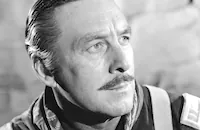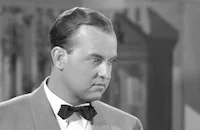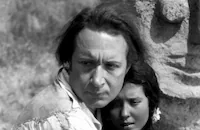My Wild Irish Rose

Brief Synopsis
Cast & Crew
David Butler
Dennis Morgan
Arlene Dahl
Andrea King
Alan Hale
George Tobias
Film Details
Technical Specs

Synopsis
During the late 1800s, Chauncey Olcott, a tugboat operator with show business aspirations, talks his way into a dinner party for star Lillian Russell. After he sings, Lillian speaks approvingly of his voice, and with that to bolster him, Chauncey Stells his mother, Mrs. Brennan, that he intends to leave home to pursue a singing career. Mrs. Brennan gives Chauncey a watch that belonged to his father, and asks him not to use his father's name until he can honor it with success. Chauncey pawns the watch to buy a banjo and, using the stage name Jack Chancellor, travels around the country singing by the roadside. One day, he trades his carriage and some money to a singing waiter for the lease on a bar in the country. Later, he stops a runaway horse carrying beautiful Rose Donovan and immediately falls in love with her. Chauncey's plans are stymied when he learns the real owner of the bar is Nick Popolis, who demotes Chauncey to janitor, and to make matters worse, Rose is engaged to a man named Terry O'Rourke. Vowing to love Rose from afar, Chauncey joins a minstrel show. Rose brings Popolis, Terry and her father John to New York to hear Chauncey sing in the minstrel show. There, Terry discovers Chauncey's feelings for Rose and sends some of his friends to beat up the singer. After Chauncey wins the fight with the help of his friends, Rose suggests that he meet her and her father at church the next day, but before he gets there, Chauncey is arrested on a warrant sworn out by Terry's friends. Several days later, Duke Muldoon, another member of the minstrel show, pays Chauncey's bail, but by this time, he has lost his job. Searching for a new job, Chauncey again encounters Lillian Russell, and she hires him to sing in her show. Publicity rumors of a romance between Lillian and Chauncey so disturb Rose that she travels to New York to discover the truth. Although Chauncey tries to explain, Rose misunderstands, and hurt, returns home. When Lillian's show closes, Popolis, who manages the Irish singer William Scanlon, hires Chauncey to sing in the show. For the first time, Chauncey performs using his own name. On St. Patrick's Day, Scanlon is unable to sing, and Chauncey takes his place. Although the crowd is furious at first, Chauncey's voice enchants them, and Scanlon dubs Chauncey his successor by giving him a watch he received from the Prince of Wales. Chauncey's mother is so moved by his singing that she apologizes for not being more supportive. Because Donovan, an alderman, only saw Chauncey perform in minstrel makeup and under a pseudonym, he does not recognize him and asks him to sing at a political rally. Chauncey agrees, then asks Rose to elope with him. Duke is delegated to bring Donovan to Greenwich, Connecticut after the ceremony. At first Donovan is furious, but when Chauncey promises to marry Rose again in church, Donovan gives the couple his blessing.

Director
David Butler
Cast

Dennis Morgan

Arlene Dahl

Andrea King

Alan Hale

George Tobias

George O'brien
Sara Allgood

Ben Blue

William Frawley

Don Mcguire

Charles Irwin
Phil Stanton
George Cleveland
Clifton Young
Oscar O'brien
Ruby Dandridge

Grady Sutton

William Davidson
Douglas Wood
Charles Marsh
Igor Dega
Pierre Andre
The Three Dunhills
Lou Wills Jr.
Andrew Tombes

Monte Blue
Charles Williams
Faith Kruger
Kernan Cripps
Johnnie Morris
Donald Kerr
Rodney Bell
Robert Lowell
Philo Mccullough
Gino Corrado
Joe Bernard
Eddie Parker
George Anderson

Jack Mower
Ross Ford

Eddie Kane
Tom Stevenson
George Campeau

Herbert Anderson
Joe Devlin
Brooks Benedict
Peggy Knudsen
Cy Shindell
Susanne Rosser
Wally Ruth

Emmett Vogan
Edward Clark
William Gould

Brandon Hurst
Forbes Murray
Winifred Harris

Sylvia Andrew
Lillian Castle
Billy Green
Crew
Ernest R. Ball
Harry Barndollar
Jay Blackton
James A. Bland
J. Keirn Brennan
Albert H. Brown
Robert Burks
Ed Carrere
Dudley Chambers
Murray Cutter
Charles Neil Daniels
Arthur Edeson
Gus Edwards
Sidney Fields
Leo F. Forbstein
David Forrest
Edwin Gilbert
George Graff Jr.
Steve Graham
Ray Heindorf
William Jacobs
M. K. Jerome
Stanley Jones
Natalie Kalmus
Ted Koehler
Mitchell Kovaleski
James Leicester
Edward Madden
Peter Milne
Irene Morra
Chauncey Olcott
Leroy Prinz
Lyle Reifsnider
Seymour Rice
William J. Scanlan
Robert B. Smith
Max Steiner
Andrew B. Sterling
John Stromberg
Dan Sullivan
Travilla
Charles Vance
Harry Von Tilzer
James J. Walker
Jack L. Warner
Perc Westmore
Rida Johnson Young

Film Details
Technical Specs

Award Nominations
Best Score
Articles
My Wild Irish Rose

My Wild Irish Rose
Quotes
Trivia
Notes
Chauncey Olcott was born in Buffalo, New York in 1860. He began his professional career in 1876 with the Thatcher, Primrose & West minstrel shows and became a well-known soloist before studying singing in London in 1890. In the United States, Olcott starred in Irish musical plays such as The Minstrel of Clare and The Heart of Paddy Whack, and popularized such songs as "My Wild Irish Rose" and "Mother Machree." He divorced his first wife, Cora, and then married Margaret O'Donovan. Olcott died on March 18, 1932. Hollywood Reporter news items add the following information about the production: The property, including all of Olcott's songs, was purchased from Charles R. Rogers Productions. Alexis Smith was to play a leading role. Nelson Eddy and Lee Sullivan were considered for the role of "Chauncey Olcott." According to a news item in Hollywood Reporter, Dennis Morgan's nine-year-old daughter made her screen debut in the film, but she is not listed in the film's credits. Ray Heindorf and Max Steiner received an Oscar nomination for their musical score.
















